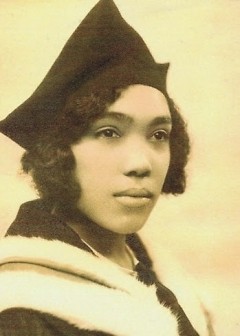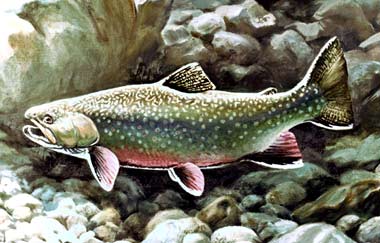Happy birthday to Coach Beilein of the University of Michigan who was born on February 5, 1953.
Sources :
Although born in Vancouver, Canada, Jennifer Granholm made history in Michigan, being elected the first woman Attorney General in 1998 and the first woman governor in 2002. She easily won reelection in 2006.
Source : Michigan Every Day.
For more information, see Jennifer Granholm Wikipedia entry
Jennifer Granhom : Michigan Governor
Women Wielding Power : Pioneer Female State Legislators
A governor’s story : the fight for jobs and America’s economic future / Jennifer Granholm and Dan Mulhern. New York : PublicAffairs, c2011.
In 1965, even as the bluegill was being proposed as the state fish in the Michigan House of Representatives, the adoption of the “trout” as the official fish of Michigan was being promoted in the Senate, sponsored by none other than State Senator Terry L. “Troutt.”
Seemingly destined for the position, the trout easily dominated the run for “officialdom” with the more significant lobbying effort. Present during the signing of the legislation in 1965 by Governor George Romney, were Dr. Don F. Woomer (Chairman of the Michigan Council for Trout Unlimited), Mary Louise Paxton of Traverse City (National Trout Queen), and Arthur Hutchings of Rochester (National Trout King).
When the time came to document the official fish in brochures and reference materials, it soon became apparent that a major shortcoming of the law was the legislation’s failure to specify a particular species of trout. Governor Romney referred this dilemma to the State Conservation Department and the Brook Trout was assigned the job.
The Conservation Department settled on the brook trout. According to a spokesperson for the department, referring to finalists in the selection process,
“Both are fine fish, and you can certainly make a strong argument for either one. Selection of the brook trout in no way puts the laker in an inferior light. Lake trout have made great contributions to Michigan’s commercial and sport fishing. The fact that so much money and effort are being expended to restore them in the Great Lakes is proof of the esteem in which they are held.
We had to choose, and the brookie seemed a little the better bet for this particular purpose.
Michigan fishermen are fortunate indeed to have so many species of trout – all of them excellent sport fish – available in the waters of their state. The brook trout will serve as a symbol for them all.”1
In 1988, the law was amended to officially recognize the “brook trout” as the “official fish of the State of Michigan.”
Michigan Law
The following information was excerpted from the Michigan Revised Statutes, Chapter 2, Section 15.
Chapter 2 State
Section 2.15 STATE FISH
2.15 Brook trout as state fish; use of materials containing reference to trout.
Sec. 1.
(1) The brook trout is designated as the official fish of the state of Michigan.
(2) The state shall make use of all materials previously prepared that contain a reference to the trout as the official fish of the state before it prepares or has prepared new materials that contain a reference to the brook trout as the official fish of the state.
History: 1965, Act 58, Eff. Mar. 31, 1966 ;– Am. 1988, Act 5, Imd. Eff. Feb. 5, 1988
A Michigan court bars Dr Jack Kevorkian from assisting in suicides.
Source : HistoryOrb.com
For more information, see :
Between the dying and the dead : Dr. Jack Kevorkian’s life and the battle to legalize euthanasia / Neal Nicol and Harry Wylie. Madison, Wis. : University of Wisconsin Press/Terrace Books, c2006. 273pp. Main Library Stacks R726 .N53 2006
Dr. Jack Kevorkian—the enigmatic and intrepid physician dubbed “Dr. Death”—has for years declined public interviews about his life and the events that led him to be a vehement advocate of doctor-assisted suicide for terminally ill patients. But here, finally, is his own life story, as told to Neal Nicol and Harry Wylie.
Dr. Kevorkian gained international notoriety in the 1990s for his passionate advocacy of choice for terminal patients, who have increasingly won the right to decide the time, place, and method of their own death in several western countries. In 1998, he assisted Thomas Youk, a terminally ill patient suffering from Lou Gehrig’s disease, with a lethal injection that was broadcast on CBS’s 60 Minutes. Immediately thereafter, Kevorkian was arrested, charged with second-degree murder, tried, and sentenced to 10-25 years in Michigan’s maximum-security prison system.
Today, Dr. Kevorkian is in his late seventies and in failing health himself. He shares an eight-by-twelve-foot cell with another inmate in the Thumb Correctional Facility at Lapeer, Michigan. The unique story Prisoner Number 284797 shares far exceeds the battle to legalize euthanasia and end human suffering for terminal patients. “Personal choice is really what it is all about. Quality of life, as opposed to maintaining existence”
In a letter written to his brother and sister December 23, 1833, describing his arrival here the previous summer, Joel Guild said: “After looking about for a home, I thought it best to move about fifty miles down Grand river” (from its junction with Maple river) “to a place called Grand River Falls.” However, there appears to be no official record that the city was at any time known as Grand River Falls.
During the first ten years after the pioneer colony of easterners arrived, the name which the community should bear was the cause of considerable strife. At first the name was “Grand Rapids,” then for eight years it was “Kent.” Finally the postal department changed it back to “Grand Rapids.”
The battle of names began away back at the time Louis Campau won out against Lucius Lyon in the race to the government land office at White Pigeon and secured a grant for the 72 acres, now the heart of the city. This tract, as the reader will recall, was bounded by the river and Division avenue, and by Fulton and Michigan streets. Uncle Louis sold the north half of it to Lucius Lyon and had his brother plat what was left as “The Village of Grand Rapids.” Mr. Lyon called his half, “Kent,” and later, joining with Dexter, Ransom, Sheldon, Daniels, Bostwick and other holders of land north, east and south of the Campau plat, had a “Village of Kent” plat recorded at Kalamazoo February 8, 1836.
Mr. Lyon and his associates were influential enough to have the post office name changed from “Grand Rapids” to “Kent,” on September 1, 1836, when Darius Winsor was appointed postmaster to succeed Leonard Slater, who had lived on the west side. And “Kent” it remained until February 6, 1844, when it was changed back to Grand Rapids once more.
Sources: Grand Rapids or Kent?
Also see Etten, William J., A Citizens’ History of Grand Rapids, Michigan, Published by A. P. Johnson for the Campau Centennial Committee, 1926.
In 1848, the Michigan Legislature voted to establish a Michigan Asylum for the Deaf and Dumb and Blind in Flint. The first student arrived on February 6, 1854. After the School for the Blind was established in Lansing in 1880, the Flint school refocused on training the deaf. Boys studied carpentry, printing, tailoring, and farming, while girls learned the sciences of cooking, sewing, darning, and patching.
Source : Michigan School for the Deaf historical marker; Traveling Through Time : A Guide to Michigan’s Historical Markers

A professor, scholar and expert on United States diplomacy, Merze Tate was the first African American graduate of Western Michigan Teachers College, first African American woman to attend the University of Oxford, first African American woman to earn a Ph.D. in government and international relations from Harvard University (then Radcliffe College), as well as one of the first two female members to join the Department of History at Howard University.
In 1990, she gave WMU a $1 million gift to establish the Merze Tate Student Education Endowment Fund, which provides support for student needs. At the time, she said she wanted to thank Western and the other institutions for helping her overcome the barriers of race and sex.
For more information, see Wikipedia entry
Mark Ranzenberger, “Merze Tate blazed her own trail”, Mt. Pleasant Morning Sun, December 29, 2009.
Sharon A. Hanks, Rediscovering Merze Tate: A remarkable African-American woman who grew up in our own backyard, Greater Grand Rapids Women’s History Council.
On February 6, 1924, the state highway department placed the first 10,000 metal signs along Michigan highways that notified drivers for the first time of railroad crossings, route markers, mileposts and danger points. These days, the Michigan Department of Transportation also keeps motorists informed of traffic, construction and weather-related delays at https://mdotnetpublic.state.mi.us/drive/.

Sources:
Historical Society of Michigan
Michigan ratifies the 20th amendment. The 20th Amendment sets January 20th as the ending date for presidential and vice presidential terms. It also sets a succession line for the presidency.
Source: Michigan History
On Feb. 6, 1950, the city of Livonia was born. The new 36-square-mile city was formally known as Livonia Township, but voters supported incorporation 2,011 to 1,741. In square area, Livonia became the second largest city in Michigan.
Source : MIRS Capitol Capsule, February 6, 2020



